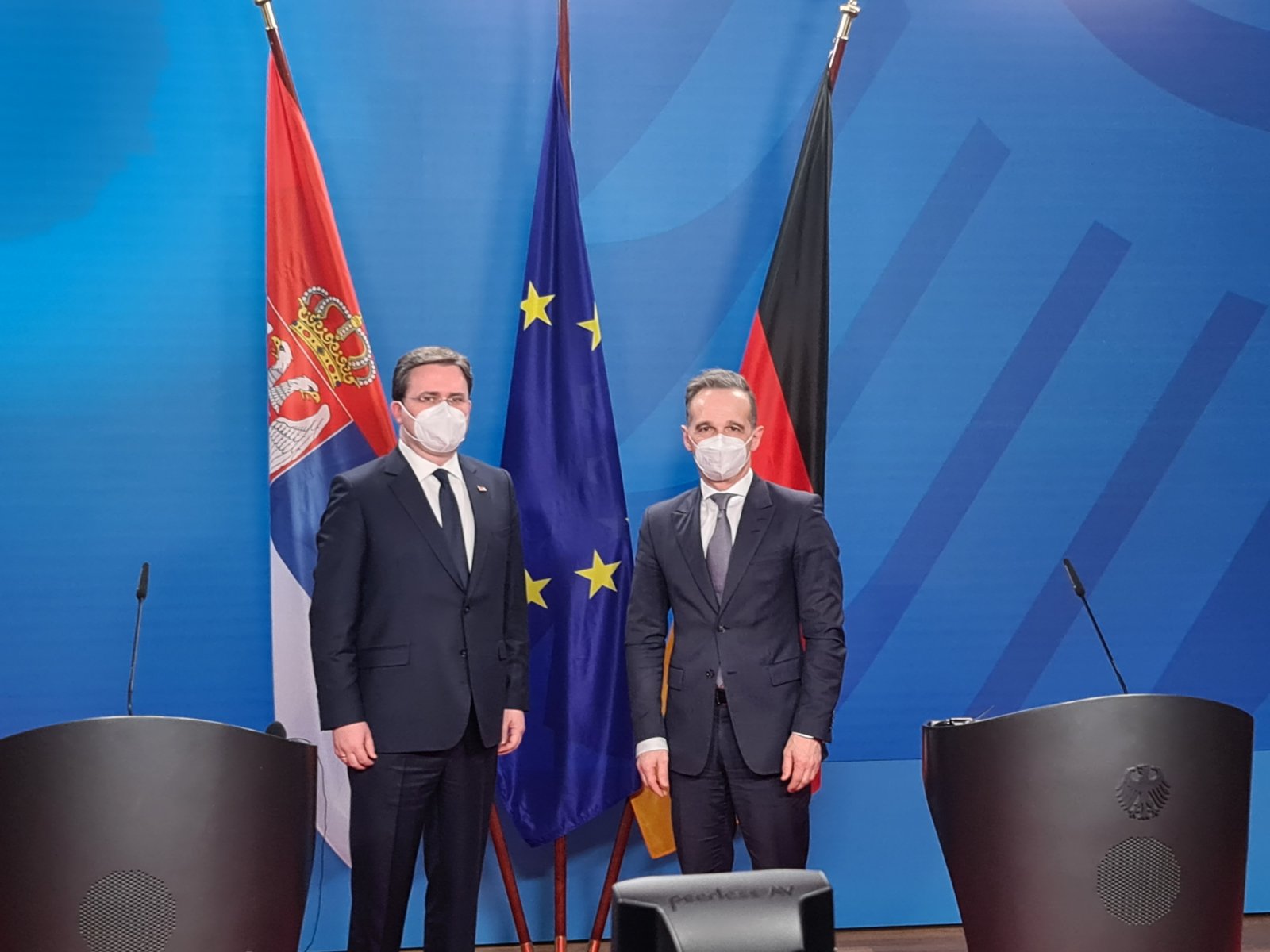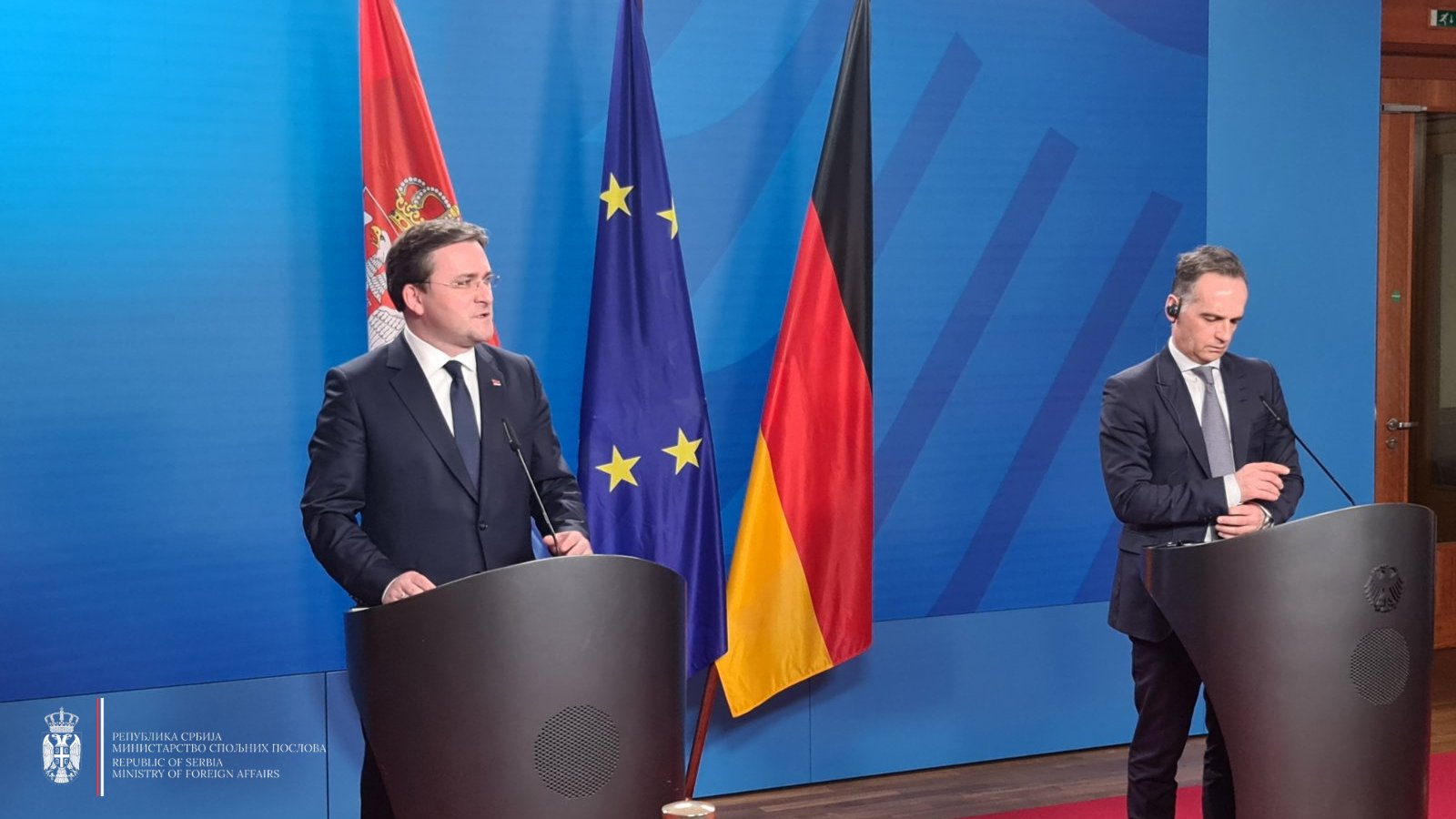04.03.2021.
The essence of Belgrade's position on the issue of relations with Pristina is that a compromise is necessary, which implies a serious approach so that neither side would get everything, but that both would get enough, Serbian Foreign Minister Nikola Selakovic said today in Berlin.
"We discussed the important issue of relations between Belgrade and Pristina, dialogue in the field of normalization of relations, and I presented the position of Serbia and expressed support for Special Representative Miroslav Lajčák", Selakovic said at a press conference after the meeting with Maas.
Selakovic noted that on that issue the essence of Serbia's position was what President Aleksandar Vucic had always said - a compromise solution, which would not mean that one side would get everything and the other nothing.
"Compromise implies a serious approach, to have a situation where neither side gets everything, and everyone gets enough", Selakovic said.
He stated that talks on this topic would continue, which he said was important on Serbia's European agenda, but also important for the stability of the region.

Selakovic once again invited Maas to visit Serbia, reminding that the visit was planned and postponed several times.
"But I want to believe that the conditions will be met as soon as possible to see each other in Belgrade, to continue the discussion, and to work together on issues of importance for Serbia and Germany and Serbia's European path", the Head of Serbian diplomacy said.
As he said, they discussed Serbia's European path, the necessity of maintaining the reform course in the field of the rule of law, as well as the freedom of the media.
"I asked for an approach that will imply a lot of concrete matters, because the reforms were always successful when we encountered openness in communication and when our attention was drawn to things that should change", Selakovic said.
He also pointed out the need to open a more obvious European perspective for the countries of the Western Balkans, a region that geographically, culturally and in terms of mentality belonged to the European family of nations.
Selakovic also stated that the economic cooperation between Serbia and Germany was excellent, and that German companies employed 67,000 people in Serbia, and the goal, he said, was to reach the number of 100,000.
He shared the information that the level of trade in goods was at EUR 5.3 billion, with the belief that it would be able to grow even higher.
Selakovic said that Germany was the key economic partner to Serbia, and a country whose assistance and helpfulness enabled Serbia to do a lot to improve the economic picture and living standard of citizens.
Furthermore, Selakovic stated that German Foreign Minister Heiko Maas told him that Serbia would soon receive 300,000 vaccines from the Covax program.
"We talked about the fight against Covid-19. I presented what Serbia can be proud of in the field of vaccination against coronavirus, but I want to thank Mr. Maas for the information shared at the meeting that 300,000 vaccines from the Covax program will be delivered to Serbia in a very short time", Selakovic said and stressed that this was very important for the continuation of immunization of the citizens of Serbia.
"It will be my pleasure to continue cooperation in the future. Once again, I invite you to come to Belgrade, to continue the talks. We need that in the region, to see many more people from EU countries, whose word is listened to carefully and whose voice significantly influences the further course of the European path of the Western Balkans and Serbia", Selakovic said.

German Foreign Minister Heiko Maas reiterated today that Berlin's position was clear and they were against any talk of changing the borders, adding that he could not say what the reaction from Brussels would be regarding Albin Kurti's statements, but said that the new administration in Pristina would have to deal with unresolved issues.
Asked whether there would be a reaction to the statements of the winner of the elections in Kosovo and Metohija, Albin Kurti, who said that dialogue with Belgrade was not his priority, as well as to the constant threats with a "greater Albania", he said that Berlin was clear in the past as well that it was against any border changes.
"I cannot estimate what kind of reaction will come from Brussels. I can say that we have always said in the past, that any discussion about changing borders is not useful. That is the line we follow and support. We start from the premise that the new government in Pristina will intensively deal with the issues that must be resolved in order for Kosovo's European perspective to unfreeze. At the moment when the government is formed, we will explicitly say so", Maas said at the press conference held after the meeting with Minister of Foreign Affairs of Serbia Nikola Selakovic.
When asked why Serbia did not open any chapters during the German Presidency of the EU, Maas said that Germany was dealing with the implementation of the agreements reached in the negotiations with Albania and North Macedonia.
"We did not succeed in that, because there are certain bilateral problems with North Macedonia. We must honestly and openly say that the EU did not have good cooperation with the former U.S. administration regarding the normalization of relations between Belgrade and Pristina. We have talked with the new government in the United States, and there is a need on their part for closer cooperation and working together on this issue. The fact that we will have a new administration in the United States opens a new opportunity that we should use", he assessed.
Discussing he vaccination process, Maas pointed out that if one was to compare the EU to China and Russia in the field of vaccination, then the Union administered twice as many vaccines per capita.
When asked about the vaccination process in Serbia and criticism leveled at vaccines from China and Russia, he said that there were certain people in Germany who criticized those who received vaccines from those countries, emphasized that it was not up to him to comment on that.
He added that he had heard that China had promised vaccines to a circle of over 46 countries.
"None of that concerns me. We have a problem with the fact that what we are doing in the EU we cannot present in the right way. If we did this the right way, we would not have to be ashamed in front of others. We need to talk in the EU so that the Covax initiative, of which we are the largest donor, will deliver vaccines as soon as possible, and by the end of May it will do so in more than 100 countries", he said adding that one million vaccines were earmarked for the Western Balkans through this program, out of which 300,000 were for Serbia.
He reminded that Pfizer-BioNTech, a European-US company, would produce more than two billion vaccines this year.
"If you look at those numbers, you don't have to get upset if vaccines are delivered from China and Russia. We should not be ashamed of what we have done so far in Europe", he emphasized.
Maas also said that Germany would strive to reach an agreement on vaccine passports, which would be acceptable to the EU's neighbors, including the countries of the Western Balkans.
"There are different opinions about a vaccine passport that could give a certain certification to those who have been vaccinated. We will try to make a certain offer that could be acceptable to our neighbors and the countries of the Western Balkans, which would open additional opportunities for us to return to normal life faster. It is necessary for more people to be vaccinated and for the vaccine to be validated with a certificate", he explained.
Asked whether the fact that he would meet with the foreign ministers of all Western Balkan countries in the coming days was a message to the region, Maas said that Germany, in the past, present and the future, was an EU country that wanted to offer a European perspective to all Western Balkan countries.
"Our long-term goal is for all Western Balkan countries to become members of the EU. During the Presidency of the Union, we worked to resolve all open issues. We vowed that in the EU, we will always strive for progress in the process of bringing countries closer to the EU. This will remain Germany's foreign policy priority", the Minister concluded.
Source: Tanjug